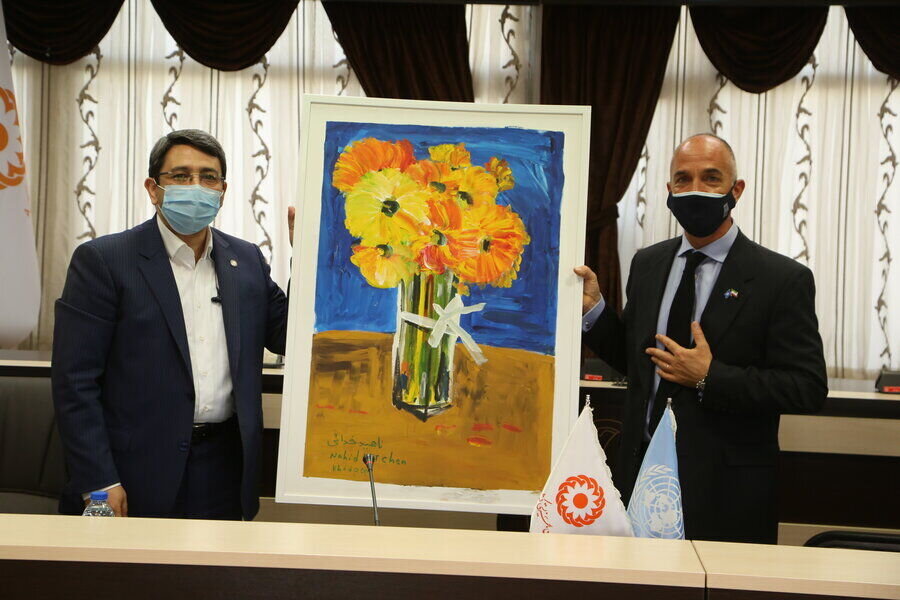UNDP praises Iran for refugee support

TEHRAN – Iran has always been praised by the world for being committed to global policies in providing financial assistance and support to vulnerable groups and refugees, Claudio Providas, United Nations Development Program representative to Iran said.
He made the remarks in a meeting with the head of the Welfare Organization, Vahid Qobadi-Dana, in Tehran on Friday, IRNA reported.
Given the Welfare Organization’s excellent performance, we allocated about 26 percent of the total budget allocated to Iran by the UNDP since 2005, amounting to $21 million, to this organization, Providas added.
Expressing appreciation to the Welfare Organization for its services to the vulnerable groups, elderly and disabled, he said that the efforts made in the fight against AIDS among vulnerable groups are one of the important achievements of the organization’s mobile clinics.
The UNDP, in collaboration with other international partners based in Tehran, is working to help vulnerable social groups, including women heads of households and needy families across the country, and is determined to improve the health system, provide medical equipment, and purchase items from Iranian companies to support domestic production.
He praised the role of the Welfare Organization in supporting non-governmental organizations and considering the expansion of their activities, noting that the role of NGOs in raising awareness, especially in times of crisis, is important and the Welfare Organization has been able to make good use of this social capacity.
Earlier in March, a memorandum of understanding signed between the Health Insurance Organization and the United Nations High Commissioner for Refugees, to cover 120,000 vulnerable refugees with insurance.
With its implementation, the number of refugees covered by social insurance services has increased by 20 percent in Iran, as 120,000 foreign nationals will be under the insurance coverage.
This measure aims to provide medical services in the form of a comprehensive basic package (outpatient, inpatient, and temporary hospitalization) for one year to the foreign nationals.
A total of 1.4 trillion rials (nearly $35 million at the official rate of 42,000 rials) have been allocated in this regard, which increased by 20 percent compared to the previous phase.
Two million foreign nationals residing in Iran
Deputy Interior Minister Javad Naserian said last week that about one million documented foreign nationals are residing in Iran, and perhaps another one million are illegally living in the country.
At the end of 2018, Iran hosted close to one million refugees, making it the sixth-largest refugee host country in the world. The country was also the eighth largest refugee-hosting country in the world in 2019, hosting 951,142 Afghan refugees and 28,268 Iraqi refugees, according to the UNHCR.
One of the largest and most protracted urban refugee populations in the world is living in Iran; about 97 percent of refugees live in urban and semi-urban areas, while three percent are residing in 20 refugee resorts run by the UNHCR's main government counterpart.
Undocumented Afghans have access to free primary health services and similarly free COVID-19 related testing, treatment, and hospitalization, just like nationals.
In Iran, UNHCR is seeking $16.2 million for its COVID-19 emergency, while requires an additional $98.7 million to support Iran in maintaining and sustaining its commendable inclusive refugee policies, under the umbrella of the Solutions Strategy for Afghan Refugees.
Education, health for foreign nationals
Many of the refugees living in Iran are the second and third generation, according to the UNHCR.
There are 40,000 Afghan students in the country, according to the official report, 17,000 of them are graduated, while the unofficial report is estimated at 26,000.
Some 47,000 people were trained and 10 percent of legal refugees were covered by social insurance with the help of the UNHCR, and other foreign nationals can pay for health insurance like Iranians.
In light of the COVID-19 pandemic, undocumented Afghans have access to free primary health services and similarly free COVID-19 related testing, treatment, and hospitalization, just like nationals.
FB/MG
